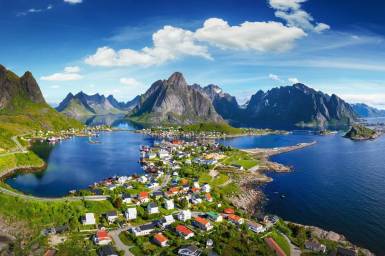Why pursue a European master's degree in Norway
 Posted date: 08 Nov 2022
Posted date: 08 Nov 2022
The welcoming environment for international students and equal approach to higher education in Norway are two of the finest things about pursuing a European master's degree there. In Norway, there are no tuition costs for any master's programs, and several are offered in English. These factors account for the nation's current international students studying at various levels.
This page provides assistance on funding as well as all the information you need to understand about postgraduate study abroad in Norway.
The geographical position of Norway results in several interesting research experiences. A portion of the nation's land resides in the Arctic, where some of Norway's leading universities are working together on cutting-edge scientific research initiatives.
Among the strongest arguments for pursuing a master's degree in Norway are the following:
Norway offers free master's programs to all students, including those from outside the EEA to study in europe.
High quality of life - Norway is a great destination to live, work, and study, consistently ranking towards the top of the quality of life tables.
Beautiful scenery - With its beautiful ports, midnight sun, and Arctic tundra, Norway is unlike any other place for nature enthusiasts.
Language: Even though learning Norwegian could be beneficial, English is commonly spoken and is of great quality as a second language, so you won't necessarily need to worry about it.
The majority of higher education institutions in Norway are state-run, while some may also be private. In total, Norway has 22 state university colleges and 7 state universities. Each of these colleges offers a somewhat wide selection of courses and carries out research in several different disciplines. Additionally, there are a number of private providers offering authorized courses, along with two national arts schools and nine specialized universities.
The Bologna process sets standards for higher education in Norway, where "first cycle" Bachelor's programs are followed by "second cycle" Master's degrees and "third cycle" Ph.D. credentials. This means that a Norwegian master's degree program will give you a credential that is accepted worldwide and satisfies the requirements for continuing postgraduate study in other nations.
Even though you often won't have to pay tuition for a Norwegian master's degree, Norway has a high cost of living. Because of this, it would be ideal to obtain some sort of outside support to pay for living expenses while you are a student in Norway. You may find many of the funding and scholarship options available to you on the official Study in Norway website.
You might be qualified for support under the Erasmus+ program, which offers loans to students who desire to study in europe as well as funding for specific programs like the Erasmus Mundus Joint Masters.
In the end, your time spent earning a master's degree in Norway will be priceless and memorable; regardless of whether you decide to take advantage of the country's exceptional research prospects or accepts a position in the workplace.
Posted By

GSP Admin




